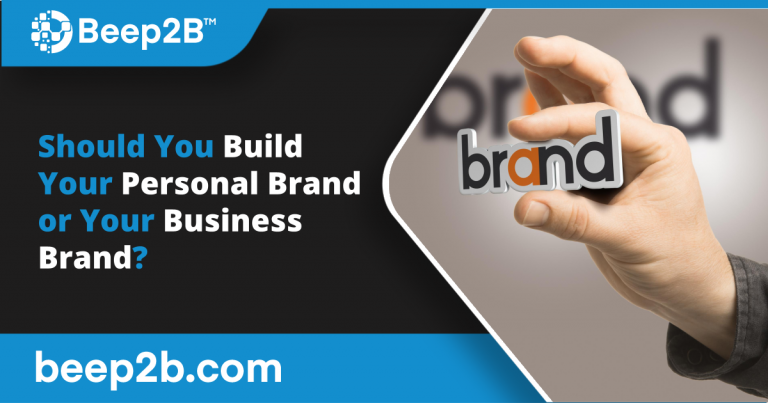Branding is crucial for increasing awareness and authority in your industry.
But when it comes to building a brand, is it best to focus on your personal brand or business brand?
Chances are, you’ve heard a lot of emphasis on both, but which is better is not always clear.
In reality, which brand you should focus on depends heavily on your ultimate goals. The choice does not have to be either/or, there are many times where it is best to build both a personal and business brand.
Today we’ll dive deep into the question of personal brand vs business brand and examine a couple of key considerations to evaluate when deciding.
What is a Business Brand?
A business brand is all about the identity you create for a business. The business name is often different from your personal name, and it reflects its own set of values, opinions, and ideas. Business brands can be created from scratch, and overall the idea of a business brand presents the notion that there is a whole team of people behind it. This can make the business seem big regardless of how small it actually is.
Sometimes, people with powerful personal brands serve as “ambassadors” to their business brand. For example, Gary Vaynerchuck has a well-known personal brand and uses it to promote his business brand, VaynerMedia.
Pros and Cons of a Business Brand
Business brands take some heavy lifting to create at first, but building one can pay off big time in some cases. Let’s take a look at the pros and cons.
Pros
- Plan your future. When you create a business brand, you have to think through your future business plans. To create a business name and brand, you’ll have to figure out what you will offer, who your ideal customer is, etc. Just going through this process can help you down the road.
- Easier to sell. Most people eventually look to sell their business. When the time comes, this will be easier if you’ve built a business brand. People will be willing to pay for a well-developed and recognizable brand.
Cons
- It’s a very hard process. Building a business brand is no cakewalk. You have to dig deep into the nitty-gritty to figure out the details before branding.
- Not as adaptable. If you want to change the course of your business, you’ll most likely have to start over creating a new business brand. Business brands are not very flexible, especially when it comes to changing your entire field of interest.
What is a Personal Brand?
A personal brand is built around a single person. The brand illuminates their personality, ideas, expertise, strengths, and more. The individual from the personal brand is its ambassador. Oftentimes, people with a personal brand as a business name the business after themselves.
However, personal brands do not always consist of only one person. Many times, they have a team of people running the brand. For example, two huge personal brands (Oprah Winfrey and Walt Disney) have an entire team.
Personal brands are not always about starting a new business. Building a strong personal brand can make you a more attractive candidate for new jobs or promotions. It can also help you position yourself as an industry influencer. While there are many uses for a personal brand, we will focus this article on the idea of using a personal brand to create a business.
Pros and Cons of a Personal Brand
There are many easy online tools available for building a personal brand. However, it’s not always the right choice. Here are some of the top pros and cons of a personal brand.
Pros
- Flexibility. Since a personal brand is tied to the business owner’s name, it can be easily adapted to business changes. It is fairly easy to pivot a personal brand to different offerings. This gives you peace of mind knowing you can be flexible to future changes.
- Great for speakers. For those who want to create a speaking career, a personal brand is particularly powerful. It’s extremely beneficial to tie your name to your industry/area of expertise. Growing your personal brand positions you nicely for speaking engagements.
- Personality. A personal brand is, well, personal. It’s about YOU. For this reason, you can inject a lot more of your personality into the brand than you can with a corporate brand.
- One-man shows. Those in one-person industries, like writing, speaking, coaching, or art, benefit immensely from a personal brand. A well-developed personal brand in a one-person industry makes you a highly attractive option for prospective clients.
Cons
- The company name does not tell what you do. When your business name is your personal name, it is not immediately clear what you do or what industry you are in. Instead, you can use a strong tagline across all platforms to reiterate your area of expertise. This will help people connect your name with your expertise.
- Difficult to sell. Selling a business may seem so far off when you are just starting out, but the long term is always worth keeping in mind. Personally-branded businesses are more difficult to sell because they are tied to an individual’s name.
Branding Tips
- Embrace change. Treat your brand, personal or business, like a living entity. It should not be stagnant. Instead, your brand should constantly evolve to fit your business best.
- Consider how you want to be known. Would you rather be seen as the founder/ CEO of a certain brand or as an expert with a personal brand? Again, consider your industry and long-term goals. Many successful personal brands also add a suffix like “International” or “Media” after they’ve grown significantly.
- What are you offering? Do your products/ services fit better with a personal brand or corporate brand?
- Leverage multiple online assets. Thanks to the internet, there are many different branding tools at your fingertips. Make sure to build a presence on the relevant platforms like LinkedIn, Facebook, Twitter, YouTube, a website blog, and more.
Can I Build a Business Brand and Personal Brand?
When it comes to creating a business brand or personal brand, it does not have to necessarily be one or the other. If building a business brand makes sense for your industry, vision, and goals, then you can also work to establish a personal authority within the industry as well.
One of the most flexible approaches to branding is to create a business brand and then serve as its ambassador by growing your personal brand. To build your personal brand alongside your business brand, you can write guest blogs, speak at engagements, appear in interviews, answer questions, share content online, and more.
While this strategy may be the best for some, it does take significantly more effort to work on two brands. At first, you may need to focus on one brand at a time, but in the long-term, it can be beneficial to have both types of brands.
Ultimately, you must consider your unique business and preferences when choosing between a business and a personal brand.


